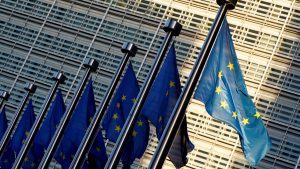The European Union (EU) has stated that it would be prioritising Nigeria, Mozambique, Angola and Senegal in its bid to fast-tracking energy transition into renewables on the continent.
The EU Ambassador to Nigeria, Samuela Isopi, at a press conference to announce its eight edition of the EU business forum scheduled to hold on the 30th of June to 1st July 2022, explained that under its European External Strategy (EES) launched recently, it is targeting Nigeria and three countries by diversifying suppliers and fast-tracking energy transition into renewables.
Isopi maintained that its member states are already reaching out to these countries to fast-track the energy transition process.
She, however, tasked the Nigerian government to address its infrastructure and security challenges to boost gas export to Europe.
“We think there is a huge opportunity for Nigeria. The current international situation is creating a huge opportunity for Nigeria, but we need to address the challenges,” she advised.

According to her, the EU bloc is by far the largest trading partner of Nigeria with about €28 billion in 2021, which she said is in favour of Nigeria with a balance of trade of €6 billion.
She said the oil and gas sector represents the bulk of the trade adding that Europe accounts for 20 per cent of Nigeria’s trade with the rest of the world.
“This is an agenda that we are trying to develop further. Discussions are ongoing between the Nigerian government and the European Union on how to deepen economic relations,” she added.
She pointed out that the European Union is the main investor in Nigeria, saying that plans are ongoing to quantify and measure the EU’s contribution to Nigeria’s economic development in terms of job creation.
She said one of the tools to reduce migration is to create economic opportunities for the youths, saying that a country like Nigeria needs to diversify its economy away from oil to promote backward integration in its quest to boost local production.
“Our dialogue with the Nigerian government on migration issues is on course and getting better. We are also expecting a delegation from Brussels to discuss migration,” she added.
Also speaking, the Team Leader, Green and Digital Economy, Ms. Inga Stefanowicz, said under its new programme and budget of the EU for the year 2021-2027, the EU would be working with the private sector to create employment opportunities, growth of SMEs.
“We are also looking for development of agriculture value chains in horticulture, aquaculture and livestock development under the Team Europe initiatives,” she added.
She said Team Europe is a recent effort of the EU to work more closely together in a way that is better coordinated to produce synergies of its impacts in different continents across the globe.
The Trade Counsellor, EU Delegation to Nigeria and ECOWAS, Mr. John Taylor, said the business forum has served as a strong platform for European and Nigerian businesses to engage with the Nigerian authorities towards improving the business environment,
“This year’s event themed ‘Nigeria and the New Economy’ will focus on three key sectors, including backward integration policy of the Nigerian Government; opportunities to increase gas exports to Europe; and new initiatives in the agricultural sector.
“While these sectors are not new, the potential in them remains largely untapped. During the 8th EU-Nigeria Business Forum, discussions will aim to identify the causes of these hindrances and explore how these opportunities can be unlocked for the mutual benefit of Nigeria and Europe,” he said.
As in previous editions, this year’s EU-Nigeria business forum will seek to identify and address the bottlenecks militating against existing investors and deter new ones from investing in Nigeria’s economy.


